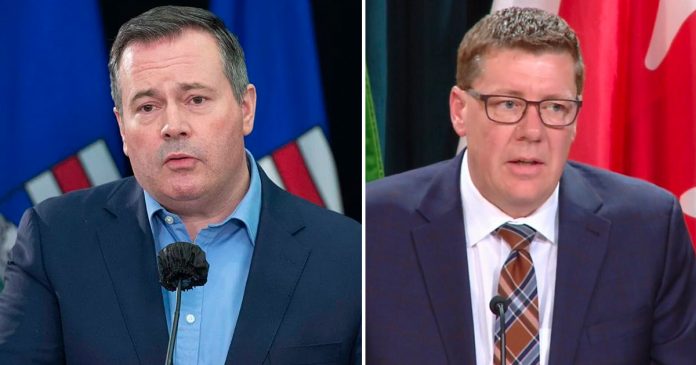On Thursday, Alberta Premier Jason Kenney and Saskatchewan Premier Scott Moe both expressed their disappointment about the Supreme Court of Canada’s ruling which upheld Prime Minister Justin Trudeau’s carbon tax.
Both provinces argued that the federal levy was unconstitutional and infringed on provincial rights.
Premier Kenney announced his dissatisfaction with the ruling during a Thursday morning press conference and promised to continue battling the federal government on the matter through other means.
“We are obviously disappointed with that decision. The Supreme Court ignored the Alberta Court of Appeals warning and discovered a new federal power that erodes provincial jurisdiction and undermines our constitutional federal system,” Kenney said.
“We’ll take time to study that decision in detail… we’ll continue to fight to defend our exclusive provincial power to regulate our resource industry, that is guaranteed in section 92A of the constitution.”
In a 6-3 decision, Canada’s highest court found that the tax was constitutional and the federal government had the right to impose pricing schemes on the provinces due to the threat climate change poses to the nation.
“Climate change is real. It is caused by greenhouse gas emissions resulting from human activities, and it poses a grave threat to humanity’s future,” Chief Justice Richard Wagner wrote.
“A failure to include one province in the scheme would jeopardize its success in the rest of Canada. What is more, any province’s refusal to implement a sufficiently stringent GHG pricing mechanism could undermine GHG pricing everywhere in Canada.”
In response to the decision, Premier Moe, whose government was involved in the constitutional challenge, stated that the result doesn’t change his position on the carbon tax being “bad environmental policy, bad economic policy and simply wrong.”
“While the Supreme Court has determined that Prime Minister Trudeau has the legal right to impose a carbon tax, it doesn’t mean he should, and it doesn’t make the carbon tax any less punitive for Saskatchewan people,” wrote Moe.
“The ruling comes with a strong dissenting opinion – one that warns that this decision has far reaching implications for federal intrusion into areas of provincial jurisdiction. Saskatchewan will remain vigilant in defending our constitutional jurisdiction from further infringement from this federal government.”
